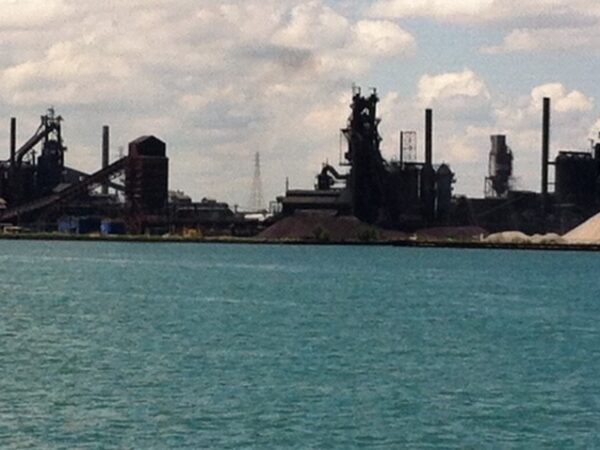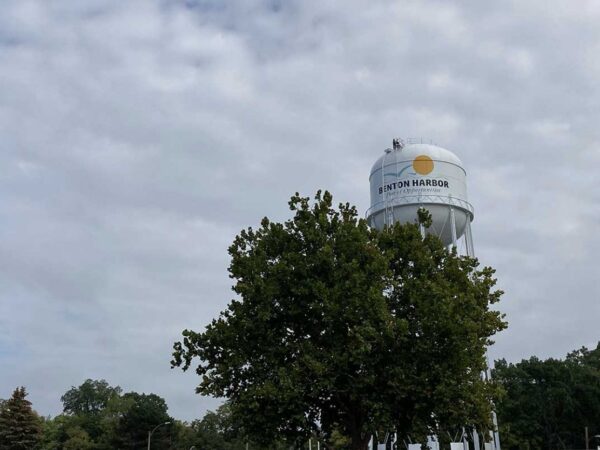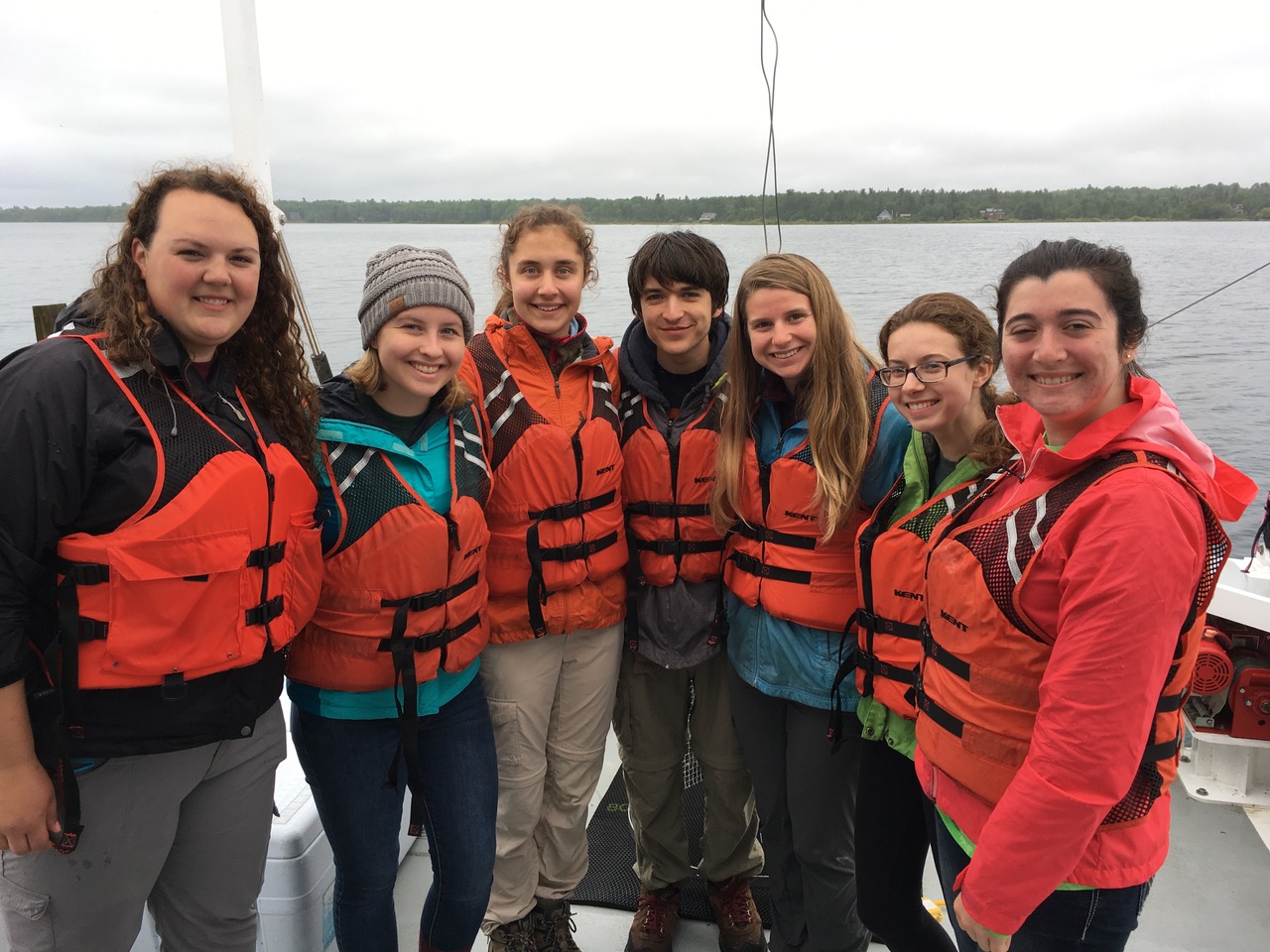
When you talk with Great Lakes scientist Jessica Kosiara it helps to be ready for terms like “trophic level fish” and “wetland food webs”.
It’s the language of her profession, aquatic ecology.
Don’t worry, Kosiara will break it down or you.
She knows it’s important for today’s Great Lakes scientists to communicate in understandable language. Language that families can relate to like those in Flint and Toledo who have experienced the sting of drinking water failures.
Failures that are not supposed to happen in a water-wealthy region like the Great Lakes.
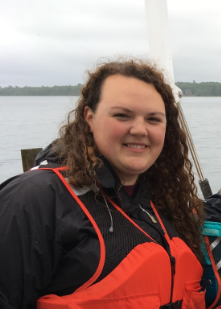
Jessica Kosiara, graduate research assistant at Central Michigan University, courtesy of Gary Wilson
Kosiara is a graduate student at Central Michigan University and works at CMU’s Biological Station on Beaver Island in Lake Michigan.
Great Lakes Now recently spent a day with Kosiara, the undergrad students she helps supervise and Professor Don Uzarski who directs the university’s Institute for Great Lakes Research.
Kosiara came to CMU from Notre Dame where she was a research technician.
CMU’s Great Lakes work “aligned with my interests and research questions I was beginning to formulate,” Kosiara told Great Lakes Now. That made joining the CMU team “a very easy decision.”
She says her work is “vital to the fabric of the region.”
“CMU has capabilities that very few universities have,” Professor Uzarski says referring to the Great Lakes research ongoing at the university.
He then described in detail isotopic analysis and plasma mass spectrometry. In lay terms, both are forensic ecology that enable scientists to connect fish to a specific wetland.
“We can then calculate the importance of coastal wetlands to the production of the $7.5 billion annual fishery,” Uzarski told Great Lakes Now.
Note the quick link from scientific research to practical application and economic benefits. Uzarski emphasizes at every opportunity that he doesn’t do research that buffs up academic resumes then collects dust on a shelf.
Wetland health is CMU and Uzarski’s signature Great Lakes work.
On the day Great Lakes Now visited Beaver Island Uzarski, Kosiara and a group of undergraduate students invited me to tag a long as they took the research vessel Chippewa out to collect water samples.
This was no drop a bucket over the side operation.
Kosiara put the budding scientists through the paces of sample collection which involved sophisticated equipment that has to be operated with scientific precision.
In demand
CMU’s Beaver Island station is in demand from students and competition is keen to be accepted according to Uzarski. The station currently has students from Boston University, Brown, Ohio University, Colorado State and the Georgia Institute of Technology.
In addition to being selective in its recruiting, CMU’s Great Lakes research competes with the top universities in the country for funding and does “extremely well,” Uzarski says.
While CMU boosts its regional and national credentials, it hasn’t forgotten its base in Michigan.
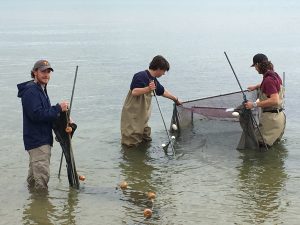
White fish researchers on Beaver Island: Connor Kowalke, Don Uzarski, Jr. and Gary Michaud, courtesy of Gary Wilson
Its students are involved with the Little Traverse Bay Bands of Odawa Indians in researching the decline of whitefish in the Great Lakes. The tribes have a historic and cultural connection to whitefish based on treaty rights.
Plus, whitefish are caught for “subsistence and economic viability” tribes’ representative Gary Michaud told Great Lakes now on Beaver Island. Michaud is a student at CMU and works with fellow students Connor Kowalke and Don Uzarski, Jr. on the project.
Science at risk?
But there’s a dark cloud hanging over this next generation of Great Lakes scientists.
The Trump administration has deprioritized science in favor of a bias for economic development when the two appear to clash.
President Trump’s proposed 2018 budget would eliminate all Great Lakes funding which would include millions of dollars for CMU’s projects. The administration’s budget director, Mick Mulvaney, says the Great Lakes have received substantial funding ($2 billion) since 2010 and it’s time for the states to take back responsibility for the lakes’ health.
The U.S. EPA is CMU’s Great Lakes partner and is targeted for a 31 per cent downsizing.
With their nascent careers hanging in the balance over a political and philosophical budget battle, how should students react?
Uzarski tells them to “stay the course.”
“Setbacks in water quality and environmental issues will always occur but, as soon as the general public begins to see the impacts first hand, things will turn around quickly.”
The research done on Beaver Island takes time to show results so it could be vulnerable to budget cutters who prioritize immediate but perhaps fleeting results over long-lasting ones.
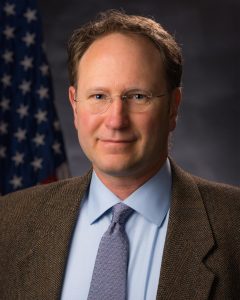
Cameron Davis Senior Advisor to the U.S. EPA Administrator, courtesy of EPA
Cameron Davis told Great Lakes Now projects like CMU’s are the type that “will lead to in-the-water results incrementally. Some maybe not even in our lifetimes.” But that long-term thinking produces results that are not “easily erasable,” Davis said.
Davis managed Great Lakes restoration as a senior adviser to the U.S. EPA during the Obama administration.
Back to graduate student Jessica Kosiara. She says it’s in her nature to “be optimistic.”
Looking years out she says the Great Lakes will continue to face obstacles. But she noted the “many people doing great work to understand ongoing problems and protect these important resources.”
Like a proud parent, Uzarski says his former students are working now in academia and state and federal agencies.
The students working on the Chippewa on a cold, rainy June morning may join those who lead Great Lakes science in the decades to come.




